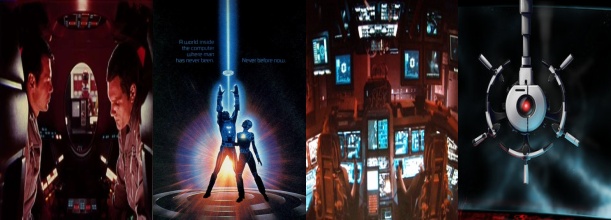50 years of the evolution of computer on film

Ooh computers. You’re using one right now to read this, I can tell. The evolution of the modern computer has been handily played out on film for nigh on 50 years. Computers and film have an interesting relationship, where something imagined by a visionary director can pave the way for innovative companies to translate the big screen to real life (and yet we still don’t have flying cars *sigh*). Hollywood never quite knows how to categorise the good old PC, as it’s been a power for good, stunningly evil, moderately romantic, hugely controlling and the ideal tool for some serious warmongering, but the portrayal on screen is always fascinating. Join us for a saunter along our film computer timeline that starts with big boxes and flashing lights and ends with creepy insidious social media taking over our very lives!
Phase 1: Rise of the Machines (1965-1989)
Although Jean Luc-Goddard portrayed a computer/narrator called Alpha 60 in his film Alphaville way back in 1965, it was Stanley Kubrick who paved the way, creating HAL 9000, a psychotic, comic and even ocasionally sympathetic spaceship computer from his masterpiece 2001: A Space Odyssey(1968). HAL was not the perfect computer but Kubrick (and of course Arthur C Clarke) understood how film could illustrate the power of these new fangled machines. In the 1970’s we had Zero from Rollerball (1975) and Mother in both Dark Star (1974) and Alien (1979), an attempt to humanise these overgrown calculators. Then Bladerunner went all robotic on us in 1982. This film was a game-changer, defining a computerised futuristic world with concepts we now actually use, such as giant billboard projection advertising. That same year Tron was released, a film that understood our obsession with the limits of modern technology, but more than that, Tron made computers stylish and cool! Then came Wargames (1983) with a young Matthew Broderick becoming one of films first teenage hackers, who accidentally almost starts World War 3 (we’ll gloss over the fact that the all-powerful nuke launching computer was outfoxed by being made to play Tic Tac Toe against itself). The 80’s also brought us the incredibly evil Skynet from The Terminator (1984) as computers become self aware. 1985’s Weird Science proved that computers could also be funny and the machines finally went mainstream when Disney produced Flight of the Navigator in 1986, about a devious alien flying machine controlled by a computer called MAX who kidnaps a little kid for fun and frolics before returning him to his hysterically worried parents 8 years later; a plot deemed entirely suitable for children, apparently.
So before the mid 1980s film computers were either of alien invention or sexily futuristic, but never part of the now. Then offices around the world started to shed their typewriters, and computers became our friends. In 1987 came Wall Street, a film at the cutting edge of technology at the time, which now looks laughable. See the fetching green screen terminals and massive mobile phones (especially at 0.53 seconds in – classy) below.
Phase 2: Enter the Hacker (1990-2000)
Then all of a sudden Hollywood seemed to tire of hardware and a new movie obsession was born. Virtual reality was where it was at, and the hitherto geeky computer hacker became the new king of action movies. With Sneakers(1982) Hackers(1985) and The Net (1985) in rapid succession, film entered the incredibly scary age of the INTERNET and the movie business was very quick to point out that ALL military computers across the world were incredibly easy to hack. As we progress through the 90’s, there was also a big sweep in movies that married computer technology with human interaction. We find Lucy, the computer who falls for her owner in Homewrecker(1992) and the same year Stephen King’s The Lawnmower Man featured a computer which turned idiot Jeff Fahey into a complete genius. Then came the infinitely more realistic You’ve Got Mail (1998) where email moves from a boring business device to the tool of the desperate internet dater (albeit with an incredibly slow startup rate); but the defining film of the hacker era was of course The Matrix (1999), which brought to life the doctrine that not only were computers everywhere but we were all merely pawns plugged into the grid. The Matrix cost $63million to make and grossed $460million worldwide, and brought us outstanding bullet time visual effects (created by computers) plus two not so brilliant sequels, all stemming from the pill-popping behaviour of a dreary computer hacker. The industry focused then on how to get humans inside the computer, and vice versa, like in David Cronenberg’s computer gamer fantasy EXistenZ (1999) where surgical penetration of little computerised monsters into the brain was de rigeur. Finally, the 90’s brought us the greatest computer comedy ever made, Office Space, where Paul Rudd’s programmer nerd decides one day he won’t be a slave to the machine. The film features a wickedly funny pastiche of mafioso thriller Casino below. Who hasn’t had days like this?
[swfobj src=”http://video.google.com/googleplayer.swf?docid=2130970494980077764″ width=”400″ height=”326″]
Phase 3: The Social Network (2000-2011)
Other than Danny Boyle’s beautiful Sunshine (2007) featuring scary self-destructing computer Icarus, computers were being roundly derided come the dawn of the new century (see 2004’s Team America: World Police). There was a certain knowing aspect to modern computer films, with the message that humans are responsible for the messes computers make of our lives (well illustrated by Disney/Pixar in Wall-E (2008), where Auto the seemingly evil starship computer has actually been programmed by humans to make them forget what a sorrowful state they have left Earth in) and not vice versa. There was a proliferation of robot movies (I,Robot, Terminator Salvation, 9, and Transformers between 2003-2009 for starters) but then the film world moved on, focusing less on the physical and much more on the immensely powerful yet intangible world of social media. Computer programs are so intrinsic in human lives; they are now the subject of entire Oscar-winning movies. The Social Network (2010) was not the first movie to centre on a website but it was a damn sight more successful than let’s say I-See-You.com, with its deft direction by David Fincher and stunning score, it changed the movie landscape for the better. And there is still room for computer romance in these modern times, but it now comes at a price. The distinctly sinister Chatroom (2010) allowed Facebook to be used as a tool for exploitation of lovers by devious minds.
In 2011, we find ourselves coming full circle, with a rumour that Leonardo DiCaprio wants to reboot Wargames and with a steady increase in the love of Cyberpunk, someone is bound to try and remake Bladerunner soon. Whatever the future of computers, if there’s a story to tell, Hollywood will make a film about it. I only ask for one thing, that Judd Apatow never gets his hands on Chatroulette: The Movie, I can only imagine how awful that could be.








Recent Comments